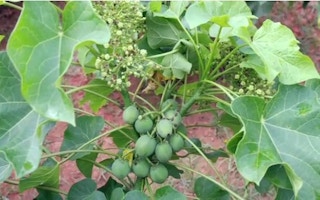Singapore-based bioenergy company JOil has announced a new genetically modified strain of the jatropha plant which produces a higher quality biofuel for use in the automotive, aviation and power generation industries.
JOil’s chief scientific officer, Dr Hong Yan, said on Monday this was the first commercial strain of genetically modified (GM) jatropha curcas plant to reach the final stages of approval for field trials.
The commercialisation of this new plant type would take three to four years “mainly due to the rigorous regulatory approval process required for GM plants in different countries”, he added.
Dr Hong said that for JOil’s non-GM varieties, the first crops are harvested after about six months of transplanting. “We expect a similar pattern for our GM jatropha varieties… in contrast to wild jatropha plants which typically do not flower or fruit in the first year,” he noted.
The company plans to set up a 1.4 hectare farm in Singapore by year-end to test their new GM strain in the field. The project, which will cost about $1 million, is pending approval from Singapore’s Genetic Modification Advisory Committee.
For the past decade, the biofuel industry has promoted the jatropha plant as an ideal biofuel crop because of its high oil content and its ability to grow on marginal lands that are too dry or nutrient-poor for food crops.
However, critics of the rapidly developing industry say that existing Jatropha projects have failed to live up to promises of high returns and minimal environmental impacts.
A 2010 study by environmental non-government organization Friends of the Earth (FoE) found that crop yields were undependable and generally lower than promised, and that farmers needed to provide significant amounts of irrigation, fertilisers and pesticides to grow viable crops.
The study further found that while jatropha plants could survive on marginal lands, they did not thrive on them. As a result, FoE noted at the time, growers and investors sought local farmland and forests for planting jatropha in places such as India, where ambitious national biofuels targets led to a surge in investments.
Earlier this month, Indian newspaper The Deccan Herald reported a decision by the Indian Oil Corporation to review its jatropha biofuel programme because of a lack of production.
However, JOil’s Dr Hong told Eco-Business that many of the failed projects were due to the use of wild species – jatropha curcas is classified as non-domesticated species – and that JOil’s breeding and GM programmes were achieving significant improvements in productivity.
Trials of jatropha strains from JOil’s breeding programme in three southern India locations have produced more than two tonnes of seeds per hectare in the first year.
Through a combination of selective breeding and GM technology, the firm aims to achieve an oil yield of three tonnes per hectare which would “ensure the commercial viability of jatropha projects”, added Dr Hong.
JOil, which is a joint venture of non-profit biotechnology research group Temasek Life Sciences Laboratory, India-headquartered Tata Chemicals and Japanese trading firm Toyota Tsusho Corporation, engineered the GM Jatropha strain to have oil with an oleic acid content of over 75 per cent compared to 45 per cent in traditional strains.
Oleic acid is the fatty acid portion of the oil from the plant’s seeds that contributes to the consistency and stability required for biofuels.
JOil has plans to develop future GM varieties with additional traits that are “either difficult or impossible with traditional breeding” such as better drought, pest and disease tolerance, said Dr Hong.
The firm expects strong Asian demand for jatropha biofuels from countries with favourable biofuel policies such as Indonesia, China, Thailand and India, he added.

















